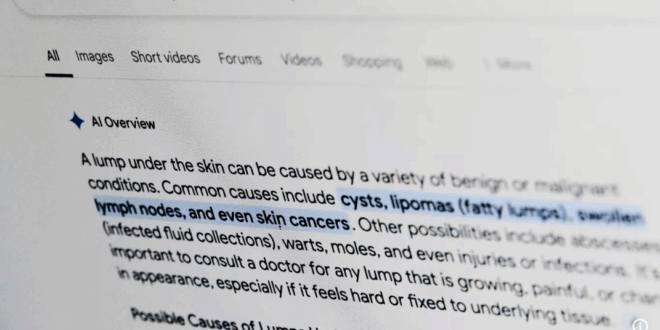Muhamad Yehia.. Cairo
Doctors say Internet searches for medical information should be undertaken with caution. Here’s guidance on what to look out for when you do turn to Google.
Dr Google is often on call for worried patients, but it may not give the most sound advice.
Doctors say Internet searches for medical information should be done cautiously, especially with the growing role of artificial intelligence (AI).
Information from the right websites can teach patients about symptoms and prepare them for a doctor’s visit. But a poorly done search might inflame anxiety well before someone reaches the waiting room.
It’s important to know the source of the information you find and to avoid trying to diagnose your health issue. Here are questions to keep in mind if you seek medical help onlin
?What’s your source
When you do a Google search, don’t automatically click the first link. It may not contain the best answers.
Some companies pay to have their websites listed at the top of a results page. Those links may be listed as sponsored.
Scroll for results that come from a source you can trust for medical information,** such as sites run by government agencies like the European Centre for Disease Prevention and Control (ECDC) or a country’s national health service
“We’ve gotten so used to clicking on that first link,” says John Grohol, a psychologist who specialises in online behaviour.
“For your health information, especially when it is personal, you want to think about it,” he sai
?Should I use AI
That depends on what it tells you.
More people are using AI to get quick answers pulled from a variety of Internet sources. Some searches also will generate an AI summary at the top of the results page
But an AI answer may not say where it got the information. That makes it hard to judge credibility.
AI also can be prone to “hallucinations,” an industry term for issues that cause the technology to make stuff up. Be especially wary of this if no source is cited.
?What should I ask
How you phrase a question plays a big role in the results you see. Doctors say patients should search for information based on symptoms, not an expected diagnosis.
“You’ve got to ask at the very beginning the right questions,” said Dr Eric Boose of the US-based Cleveland Clinic.
That means asking, “What could cause a lump to form under my skin?” instead of “Is the lump under my skin cancer?
Focusing on a diagnosis means you may miss other explanations, especially if you just click the first few links listed in the results.
For some issues, you should skip the search altogether. If you are having chest pains, experiencing dizziness, or showing signs of a stroke, seek help immediately.
“You don’t want to delay something that should be treated within a certain amount of time,” said Dr Olivier Gherardi, medical director of Brown University Health Urgent Care in the US.
?Can the internet diagnose a problem
No. Leave that to the real doctors who are trained to ask questions that lead to a diagnosis
“There are a lot of symptoms that overlap between minor conditions and major medical problems,” said Dr Sarah Sams, a board member with the American Academy of Family Physicians.
Blood in your urine could mean cancer. It also might be caused by kidney stones or an infection.
Unexplained weight loss could also be a sign of cancer. Or it could reflect an overactive thyroid or a new job that causes you to move around more.
In all these situations, some testing and a visit with a doctor who knows your medical history may be the best medicine.
 موقع وجه أفريقيا موقع وجه أفريقيا هو موقع مهتم بمتابعة التطورات في القارة الأفريقية
موقع وجه أفريقيا موقع وجه أفريقيا هو موقع مهتم بمتابعة التطورات في القارة الأفريقية



